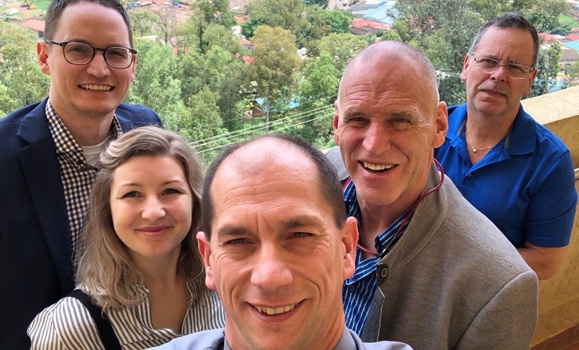By Jodi Reid

Andrew Fagan (MD '16), Adrienne Benoit (MN, HP '16), David Horne, Keir Stewart (MD '81) and Lance Mitchell travelled to Rwanda in 2019 to learn how they could help tackle a common ailment killing young people in Rwanda. (Provided photos)
Strep throat. It's not exactly a diagnosis that would strike fear in the hearts of Canadians. But in Rwanda, the hearts of thousands of young people are being hit hard from complications of this common ailment.
Left untreated, strep throat can develop into rheumatic heart disease (RHD) a chronic condition that damages heart valves and may progress to severe breathing issues and eventually death. In Canada, where strep throat is easily diagnosed and treated, cases of RHD are rare. In Rwanda, strep throat is seldom diagnosed or treated, and RHD has become rampant, accounting for an estimated 20 per cent of all hospital cases.
Without heart valve replacement surgery, patients with advanced RHD will die.
Collaborating with Rwandan partners and building on previous humanitarian efforts, the Department of Surgery's Dr. Keir Stewart (MD '81) and Dr. David Horne created the Canadian Rwanda Open-heart Project (CROP). This spring, these cardiac surgeons will lead two Halifax teams, including 11 Dalhousie medical and nursing alumni, to perform cardiac surgeries at King Faisal Hospital in Kigali, Rwanda. The first team of 16 will replace heart valves in 10 adult patients with RHD; the second team will operate on 10 pediatric patients with congenital heart conditions or RHD.
More than "just heart surgery"
While life-saving surgery is often the highlight of humanitarian missions, the CROP surgeries will actually be a foundation for more ambitious goals.
"Our fact-finding trip in 2019 came right after the King Faisal Hospital hired a cardiac surgeon the only one in Rwanda," says Dr. Stewart. "With that development, there was clearly an opportunity for us to do more than just heart surgery' for one week. We committed to a three-year project to do surgeries once per year with the Rwandan team, who can then use that experience to help develop their own independent cardiac surgery program."
A typical valve replacement surgery involves eight or nine health professionals, including surgeons, nurses, anesthesiologists, perfusionists, and post-operative and ICU teams. Adding the cardiac surgeon was the last piece of the Rwandan cardiac surgery team puzzle.
"The Rwandan team members have been training piecemeal over the years, often outside of their country," says Dr. Horne. "But they weren't going back to a program where they could actually practise their skills, so they would lose them. Now they finally have that last team member in place, but others have lost some skills in the meantime."
That challenge was exacerbated by the pandemic, which halted travel and training opportunities; the CROP trip itself was postponed several times. Safety is a top priority for the Halifax and Kigali organizers.
See one, do one, teach one
For the trip in May, the Rwandan team will work hands-on with their CROP counterparts to learn and then practise surgical procedures, using a "see one, do one, teach one" approach that builds skills and confidence and will be familiar to many Dal clinical alumni.
The initial goal after the trip is for the Rwandan team to do one or two lower-risk surgeries per week on their own. Back in Halifax, the CROP team will provide any additional training the Rwandans identify they need to start operating independently.
For his first humanitarian mission, Dr. Stewart is amazed with the generosity and commitment of the CROP volunteers who are freely giving their talent, fundraising to pay for their travel and taking vacation time for a trip that is not without risks.
Dr. Horne, who has volunteered in Kenya for several years, knows that the efforts are worth it. "Over a career when you've seen colleagues improve and do their own thing, that is more lasting than the work I've done with patients just one-on-one. In the end, we're not operating on ten people - we're touching the next thousand people this Rwandan team works on."
Donate here to support the CROP team's upcoming mission trip and help create better outcomes for patients in Rwanda.










